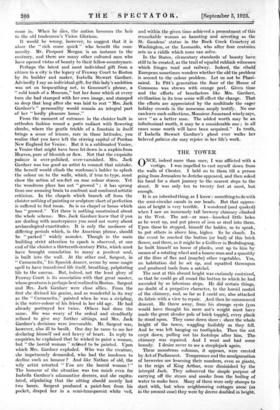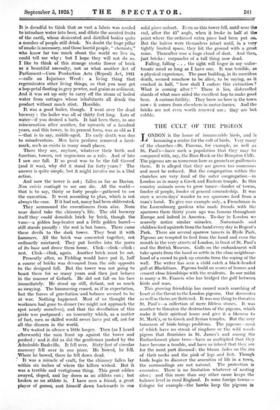THE TOWER O NCE, indeed more than once, I was afflicted
with a. vertigo. I was impelled to cast myself down from the walls of Chester. I held on to them till a person going from Jerusalem to Jericho appeared, and then asked his hand for a short journey to the -nearest steps to the street. It was only ten to twenty feet at most, but enough.
It is an inherited thing, as I know : something to do with the semi-circular canals in our heads. But that oppres- sion of height is very terrible. I wondered (and quaked) when I saw an immensely tall brewery chimney climbed in the West. The ant—or man—knocked little holes as he went up, and put pieces of iron or steel into them. Upon these he stepped, himself the ladder, so to speak, to put others in above him, higher. So he clomb. In the event he reached the button (or bud) of this brick flower, and there, as it might be a Gulliver in Brobdingnag, he built himself an house of planks, sent up to him by means of a rotating wheel and a hoarse man and a quantity of the fibre of flax and (maybe) other vegetables. Yea, an habitation did he set up, and squatted thereupon and .produced tools from a satchel. The nest at this absurd height was curiously contrived, so that he could go all round the. button, to which he had ascended by so laborious steps. He did certain things, no doubt of a purgative character, to the horrid nostril of the chimney, and, so far as I. could see, also attacked its fabric with a view to repair. And then he commenced descent. He threw away, from his strange eyrie (you would have thought his mere ant's weight must have made the great slender pole of brick topple), every plank he stood upon. They came down sheer : sheer the whole height of the tower, waggling foolishly as they fell. And he was left hanging on toothpicks. Then the ant crept down, pulling out his footsteps after him. The chimney was repaired. And I went and had some brandy. I desire never to see a steeplejack again. These monstrous columns, it appears, were erected by Act of Parliament. Temperance and the amalgamation of breweries are lessening their numbers, even as giants, in the reign of King Arthur, were diminished by the intrepid Jack. They subserved the simple purpose of carrying off the steam and smoke from the boiling of water to make beer. Many of them were only stumps to start with, but when neighbouring 'Cottages arose (as in the present case) they were by decree doubled in height. It is dreadful to think that so vast a fabric was needed to introduce water into beer, and dilute the scented fruits of the earth, whose desiccated and distilled bodies quite a number of people still drink. No doubt the huge pillar of smoke is necessary, and those horrid people, " chemists," who know far too much about the world we live in, could tell me why ; but I hope they will not do so. I like to think of this strange exotic flower of brick as a beautiful necessity, not as what another Act of Parliament—Corn. Production Acts (Repeal) Act, 1921 —calls an Injurious Weed : a living thing that regerminates other living things, so that you may get a hop-petal floating in grey pewter, and grains as sediment. And it was set up only to carry off the steam of boiled water from cottages whose inhabitants all drank the product without much stint. Horrible. It was a good boiler, though. I went over the dead brewery : the boiler was all of thirty feet long. Lots of water—if you desired a bath. It had been there, in one reincarnation after another, for upwards of a hundred years, and this tower, in its present form, was as old as I —that is to say, middle-aged. Its early death was due to misadventure. Men have perforce removed a land- mark, such as exists in many small places.
There they are, anyhow, whatever their birth and function, towers, not ungracious as a rule. And of late I saw one fall. If so great was to be the fall thereof (and it was), why did it stand for forty years ? The answer is quite simple, but it might involve me in a libel action.
And now the tower is not ; fallen as far as Darius.
Non cuivis contingit to see one die. All the world— that is to say, thirty or forty people—gathered to see the execution. It went according to plan, which is not always the case. If it had not, many had been obliterated. They summoned the executioners from afar. None near dared take the chimney's life. The old brewery itself they could demolish brick by brick, though the vane—a gOlden hop-beater and a little golden barrel— still stands proudly : the rest is but bones. There came these devils to the dark tower. They beat it with 'hammers. All the brick was concreted together, not ordinarily mortared. They put beetles into the pores of its base and drove them home. Clink—clink—clink : rest. Clink--Mink, again. Another brick must be out. Presently after, as Fielding would have put it, half a course of bricks was devoured from the side opposite to the designed fall. But the tower was not going to boast there foi so many years and then just behave in the manner of Goliath. He did not fall on his face iramediatelr.- He stood up still, defiant, not so much as swaying. The hammering ceased, as if in expectation, but the forces of gravitation' and balance seemed to be at ' war. Nothing happened. Most of us thought the workmen had gone to dinner (we might not approach the spot nearly ourselves), and that the decollation of this ;pride was postponed : an insecurity which, as a matter of fact, men so skilled would never have put off, not for all 'the . dinners in the world.
We Waited in silence a little longer. Then (as I heard afterwards) the men leant up against the tower and :pushed ;' and it did as did the gentleman pushed by the 'Admirable Bashville. It fell over. Sixth' feet of circular masonry fell over in one piece. He Bowed, he fell. Where he bowed, there he fell down dead.
It was a miracle of craft, for the chimney fallen lay within six inches of where the killers wished. But it was a terrible and vertiginous thing. This great edifice swayed, sloped, and lay down as an athlete can ; but broken as no athlete is. I have seen a friend, a great player of games; cast himself down backwards in one solid piece unhurt. Even so this tower fell, until near the end, after the 45° angle, when it broke in half at the point where the ordained extra piece had been put on. But the halves were themselves intact until, in a very tightly limited space, they hit the ground with a great noise. Thereafter rose a huge cloud of dust. And then, just bricks : corpuscles of a tall thing now dead.
Falling, falling . . . the sight will linger in my unfor- tunate mind so long as I have one. It was terrible, as a physical experience. The poor building, in its mereiless death, seemed somehow to be alive, to be saying, as it cracked in half, " how shall I endure this extinction ? What is coming after ? " There it lies, dishevelled shards of what once aided the excellent hop to make good beer. A curious futility. They brew no beer in the town now : it comes from elsewhere in motor-lorries. And the bricks are not even worth renewed use ; they are but rubble.











































 Previous page
Previous page